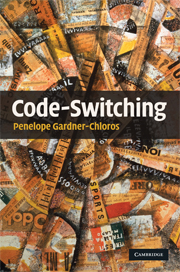
Being an observer of language use in Québec City; observation of code-switching.
Since Quebec City's linguistic landscape is predominantly French, it is not surprising to observe very little bilingualism in daily language use; little code-switching or alternation. French is the main language taught at school. French is evaluated nation-wide (across the province) at the end of Secondary 5, at the end of Cégep and when entering University.
True, there are some borrowings and some Anglicism here and there, but on the overall the language used is French in the French speaking community. The main media, Radio-Canada, La Presse, Le Devoir, promote the correct usage of French. Contrary to France, the introduction of English words is not fashionable here, in the upper educated layers of society. The average Quebecer is rarely fluent in English, not sufficiently to alternate effortlessly from one language to the other. Most will use some occasional words (wipers, tires, tester, brushing, etc.) The average Quebecers who engage in conversation with tourists in English (L2) will code-switch when they are experiencing difficulties finding some words.
As a mother of teenagers who listen to American music and who practice sports, I do observe some English words: download, check, game, etc., but in our household, we prefer that they use the appropriate vocabulary and syntax.
At Laval University, in the Beals program (Baccalauréat de l'enseignement de l'anglais langue seconde), I observe a somewhat different language use: some students are Anglophones and expresses themselves in English all the time, some are bilingual (native bilinguals) and speak both languages depending on their interlocutors. Finally, some are French speaking students who have learned English later on, like I did. They speak English in the classrooms but regularly revert to French in the middle of conversation. It is a perfect example of the mixing of languages resulting from interaction with others.
When I observe code-switching in the Beals program, it seems to occur for the following reasons:
- Francophone students encounter a difficulty while expressing themselves in English, they revert to French when not finding the appropriate word.
- When they feel shy or inadequate in front of Anglophones who are very fluent.
- Some native bilinguals are so fluent in both languages that they use the alternation of both languages without any particular reason.
True, there are some borrowings and some Anglicism here and there, but on the overall the language used is French in the French speaking community. The main media, Radio-Canada, La Presse, Le Devoir, promote the correct usage of French. Contrary to France, the introduction of English words is not fashionable here, in the upper educated layers of society. The average Quebecer is rarely fluent in English, not sufficiently to alternate effortlessly from one language to the other. Most will use some occasional words (wipers, tires, tester, brushing, etc.) The average Quebecers who engage in conversation with tourists in English (L2) will code-switch when they are experiencing difficulties finding some words.
As a mother of teenagers who listen to American music and who practice sports, I do observe some English words: download, check, game, etc., but in our household, we prefer that they use the appropriate vocabulary and syntax.
At Laval University, in the Beals program (Baccalauréat de l'enseignement de l'anglais langue seconde), I observe a somewhat different language use: some students are Anglophones and expresses themselves in English all the time, some are bilingual (native bilinguals) and speak both languages depending on their interlocutors. Finally, some are French speaking students who have learned English later on, like I did. They speak English in the classrooms but regularly revert to French in the middle of conversation. It is a perfect example of the mixing of languages resulting from interaction with others.
When I observe code-switching in the Beals program, it seems to occur for the following reasons:
- Francophone students encounter a difficulty while expressing themselves in English, they revert to French when not finding the appropriate word.
- When they feel shy or inadequate in front of Anglophones who are very fluent.
- Some native bilinguals are so fluent in both languages that they use the alternation of both languages without any particular reason.
NB: Code-switching is also referred to as language alternation, code-mixing or"alternance codique " in French. See Code-switching (2009).


Aucun commentaire:
Enregistrer un commentaire